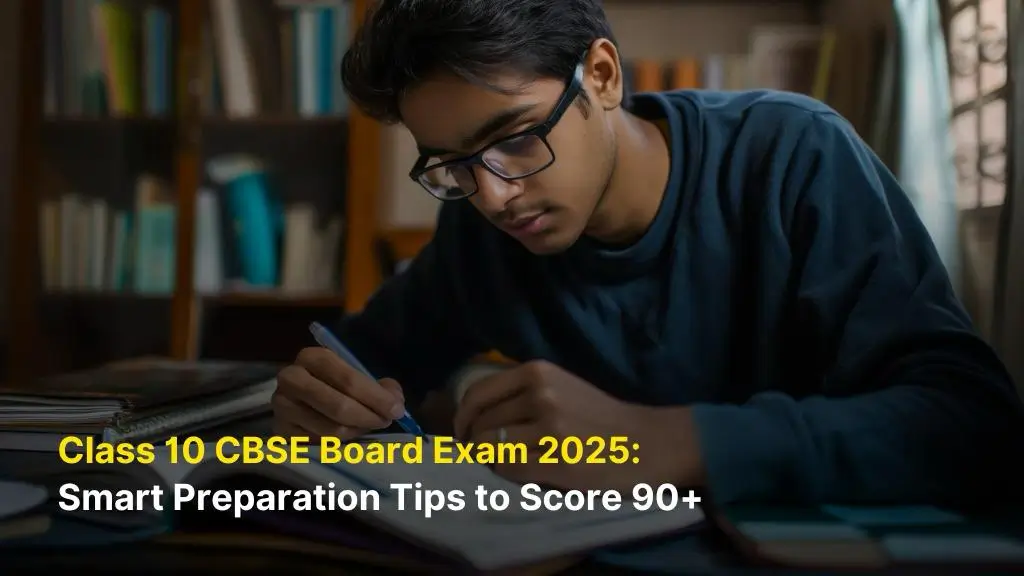The CBSE Class 10 Board Exam 2025 is a milestone in every student’s academic journey. Scoring 90+ not only boosts confidence but also lays a strong foundation for future competitive exams like JEE and NEET. With the right strategy, smart time management, and consistent practice, students can excel in their exams without unnecessary stress.
Before diving into preparation tips, let’s understand why CBSE holds a unique position compared to other boards like ICSE, IGCSE, IB, and State Boards. While CBSE emphasizes conceptual clarity and exam readiness, ICSE is known for its detailed syllabus, IGCSE for international exposure, IB for holistic learning, and State Boards for state-specific focus. (You can read our detailed guide on IB vs CBSE vs ICSE vs IGCSE vs State Boards for more insights.)
1. Understand the CBSE Syllabus and Weightage
The NCERT syllabus is the backbone of CBSE exams. Students must prioritize high-weightage chapters in subjects like Mathematics and Science. For example:
- Maths: Algebra, Geometry, Trigonometry, Statistics.
- Science: Physics (Light, Electricity), Chemistry (Acids, Bases, and Salts), Biology (Life Processes).
- Social Science: History (Nationalism in India), Geography (Resources & Development), Economics (Development).
2. Create a Realistic Study Plan
Divide your day into focused study blocks:
- Morning: Fresh concepts and theory-heavy chapters.
- Afternoon: Problem-solving (Maths, Science numericals).
- Evening: Revision and past year papers.
Weekly targets should include completing one full subject unit and revising older topics. Unlike ICSE, which demands descriptive answers, CBSE rewards concise, point-based responses — so tailor your preparation accordingly.
3. Prioritize NCERT Solutions and Previous Papers
The majority of CBSE Class 10 exam questions are directly or indirectly based on NCERT textbooks. Solving all in-text and back exercises is non-negotiable.
Additionally, solve:
- Past 10 years’ question papers
- Sample papers issued by CBSE
These resources help in identifying repeated questions, exam trends, and time allocation. (For students comparing with other boards, note that State Boards also rely heavily on past year papers, while IGCSE emphasizes mock tests.)
4. Use Smart Revision Techniques
- Flashcards & Mind Maps: Great for quick recall of formulas, definitions, and dates.
- Mnemonics: Helps in subjects like Biology and History.
- Flowcharts & Diagrams: Improve answer presentation and fetch extra marks.
Unlike IB or IGCSE, which stress analytical reasoning, CBSE answers should be structured, crisp, and diagram-supported for maximum marks.
5. Practice Mock Tests under Exam Conditions
Timed mock tests help balance speed and accuracy. After every test:
- Analyze mistakes.
- Revisit weak topics.
- Re-attempt similar questions until you gain confidence.
This approach builds exam temperament and reduces stress. (Students preparing for ICSE Class 10 may need to focus more on long-form answers, while CBSE students should master short, to-the-point writing.)
6. Stay Consistent and Focused
Success in Class 10 exams isn’t about last-minute cramming. Instead:
- Stick to a daily routine.
- Avoid spending too much time on one subject.
- Take short breaks and get enough sleep.
- Stay positive and avoid distractions.
Key Takeaways
- Focus on NCERT books and previous year papers.
- Plan study blocks for better productivity.
- Use smart revision tools like flashcards, diagrams, and flowcharts.
- Practice mock tests to boost confidence and improve time management.
- Maintain consistency and balance academics with well-being.
With expert guidance from Suresh Dani Classes, students can adopt smart study strategies, focus on high-scoring topics, and build the confidence needed to secure 90+ in CBSE Class 10 Board Exam 2025.






